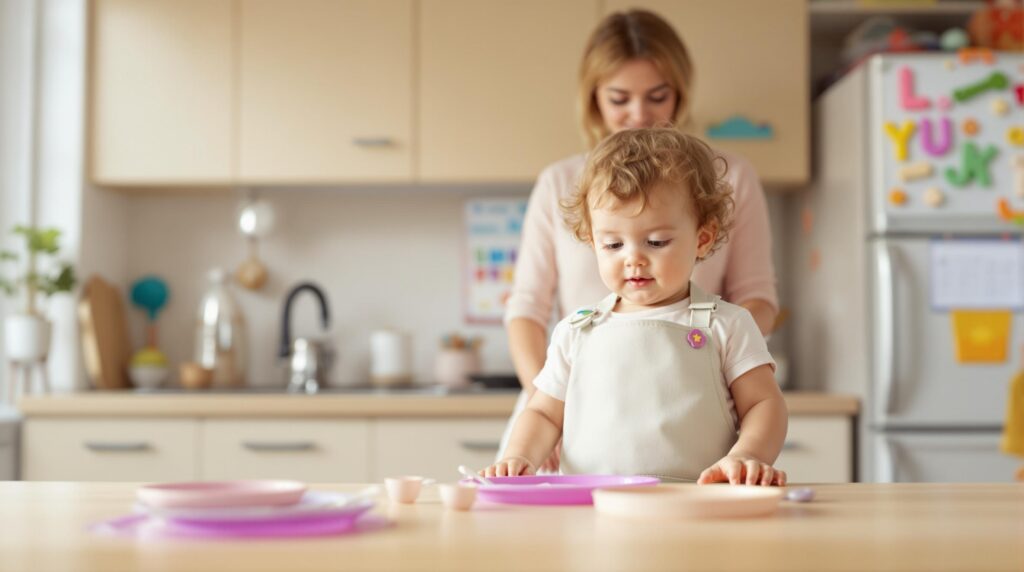Table of Contents
ToggleEncouraging a toddler’s independence is a crucial part of their development, but it can be a tricky balance for parents. As your little one grows, they’ll naturally want to do more things on their own. This desire for autonomy is healthy and should be nurtured, but it’s also important to maintain appropriate boundaries and ensure their safety. Let’s explore how you can foster your toddler’s independence while keeping things under control.
Understanding Toddler Development: The Foundation of Independence
To effectively encourage your toddler’s independence, it’s essential to understand where they are in their developmental journey. Toddlers are in what developmental psychologists call the preoperational stage of cognitive development, which typically spans from ages 2 to 7.
During this stage, your child’s thinking becomes more sophisticated. They develop the ability to use symbols and language to represent objects and ideas. This is why you might see your toddler pretending a block is a phone or a stick is a magic wand. Their imaginative play is blossoming, and with it, their desire to do things “all by myself!”
This newfound symbolic thinking also means your toddler is starting to understand that objects and people continue to exist even when they can’t see them. This concept, known as object permanence, is a significant cognitive milestone that contributes to their growing independence.
Key Developmental Milestones
As your child progresses through toddlerhood, they’ll hit various milestones that signal their readiness for more independence. Here are some key ones to look out for:
- Around 18 months: Your toddler will likely engage in simple pretend play and show affection to familiar people. They might also start to assert their independence by saying “no” more often.
- By 2 years: Expect to hear simple 2-4 word sentences and see your child point to things in books. They’ll also start to show more interest in other children, though parallel play is still common at this age.
- Around 3 years: Your child will begin to take turns in games and engage in more complex imaginative play. They’ll also start to dress and undress themselves, though they might still need help with buttons and zippers.
Remember, every child develops at their own pace. These milestones are general guidelines, not strict rules. If you have concerns about your child’s development, it’s always best to consult with your pediatrician.

Creating a Safe Environment for Exploration
One of the most effective ways to encourage your toddler’s independence is by creating an environment where they can safely explore and learn. This doesn’t mean you need to completely redesign your home, but some thoughtful adjustments can go a long way.
Start by getting down to your child’s level – literally. Crawl around and see your home from their perspective. Look for potential hazards like sharp corners, unstable furniture, or small objects that could be choking hazards. Address these issues to create a space where your toddler can roam more freely.
Consider setting up engaging learning areas that are easily accessible to your child. For example, a low shelf with age-appropriate books, a small table for coloring or playdough, or a dress-up corner with easy-to-manage clothes. These areas invite independent exploration and play.
In the kitchen, you might designate a low drawer or cabinet for safe kitchen tools your toddler can use. This could include plastic bowls, wooden spoons, and measuring cups. When you’re cooking, they can “help” by playing with these items, fostering their sense of independence and mimicking your actions.
Offering Age-Appropriate Tasks to Encourage Independence
Providing your toddler with age-appropriate tasks is a fantastic way to nurture their growing independence. These tasks should be simple enough for your child to manage with minimal assistance but challenging enough to give them a sense of accomplishment.
For younger toddlers (around 18 months to 2 years), simple tasks might include:
- Putting toys in a basket during cleanup time
- Helping to put clothes in the laundry hamper
- Assisting in simple food preparation, like adding pre-measured ingredients to a bowl
For older toddlers (2.5 to 3 years), you can introduce slightly more complex tasks:
- Dressing themselves (though they might need help with buttons and zippers)
- Helping to set the table with plastic cups and plates
- Watering plants with a small watering can
Remember to use positive reinforcement when your child completes these tasks. A simple “Great job putting your toys away!” can go a long way in boosting their confidence and encouraging future independence.
Balancing Independence and Parental Guidance
While it’s important to encourage independence, it’s equally crucial to maintain appropriate boundaries and guidance. This balance helps your toddler feel secure while they explore their growing abilities.
Setting clear boundaries provides a framework within which your toddler can safely exercise their independence. These boundaries should be consistent and age-appropriate. For example, “We always hold hands when crossing the street” or “We use gentle hands with our pets.”
As your child grows and matures, you can gradually increase their independence. This might mean letting them choose between two outfit options, or allowing them to pour their own cereal (with supervision). The key is to incrementally expand their autonomy while maintaining consistent rules and expectations.
Remember, it’s okay for your toddler to make mistakes or struggle a bit with new tasks. Resist the urge to immediately step in and do it for them. Instead, offer encouragement and gentle guidance. This approach helps build their problem-solving skills and resilience.
Fostering Communication and Language Skills
Encouraging your toddler’s verbal expression is a vital part of fostering their independence. As their language skills develop, they’ll be better equipped to express their needs, wants, and ideas.
Engage your toddler in conversations throughout the day. Narrate what you’re doing, ask open-ended questions, and give them time to respond. Even if their words aren’t clear, responding to their attempts at communication reinforces the importance of language.
Reading together is another excellent way to boost language skills. Choose books with simple stories and clear pictures. Encourage your toddler to point to objects in the book and name them. As they get older, ask them to predict what might happen next in the story.
Remember, every interaction is an opportunity for language development. When your toddler hands you a toy, you might say, “Oh, you’re giving me the red ball. Thank you!” This not only acknowledges their action but also introduces new vocabulary.
Supporting Social-Emotional Growth
Social-emotional development is a crucial aspect of your toddler’s journey towards independence. This involves learning to understand and manage emotions, develop empathy, and interact positively with others.
Provide opportunities for your toddler to interact with peers. Playdates, playground visits, or toddler classes can help them practice social skills like sharing and taking turns. Remember, at this age, parallel play (playing alongside, rather than with, other children) is still common and developmentally appropriate.
Help your toddler identify and name their emotions. When they’re upset, you might say, “I can see you’re feeling frustrated because the puzzle piece doesn’t fit.” This validates their feelings and gives them the vocabulary to express themselves.
Encourage empathy by pointing out how others might feel. For instance, “Look, your friend is crying. She seems sad. How can we help her feel better?” This helps your toddler develop emotional intelligence and consider others’ perspectives.
Promoting Physical Health and Well-being
A healthy body supports a child’s growing independence. Providing a balanced diet and encouraging regular physical activity are key to supporting your toddler’s development.
Offer a variety of nutritious foods and let your toddler have some control over what and how much they eat (within reason, of course). This can help prevent picky eating and foster a healthy relationship with food. You might let them choose between two healthy snack options or help you prepare simple meals.
Physical activity is crucial for developing motor skills and burning off that boundless toddler energy. Encourage outdoor play, dancing, or simple exercises like jumping jacks. Make it fun by turning it into a game or doing it together as a family.
Don’t forget about sleep. Consistent bedtime routines help toddlers wind down and get the rest they need to grow and learn. A well-rested child is often more capable of handling the challenges that come with growing independence.
Evaluating Progress and Adjusting Strategies
As your toddler grows and develops, it’s important to regularly assess their progress and adjust your approach accordingly. What worked last month might not be as effective now, and that’s okay.
Keep an eye on how your child is meeting developmental milestones, but remember that every child develops at their own pace. If you have concerns, don’t hesitate to discuss them with your pediatrician.
Be flexible in your approach. If your toddler seems frustrated with a particular task, consider breaking it down into smaller steps or finding an alternative way to encourage that skill. For example, if they’re struggling with buttons, you might start with larger buttons or practice the motion using a button board before moving to clothing.
Celebrate your toddler’s successes, no matter how small. Each new skill mastered is a step towards greater independence. Your positive reinforcement will encourage them to keep trying and learning.
The Role of Quality Child Care in Supporting Independence
If your toddler attends daycare or preschool, the quality of this care plays a significant role in supporting their growing independence. High-quality child care involves both structural elements (like staff qualifications and child-to-staff ratios) and process features (like the interactions between caregivers and children).
In a high-quality child care setting, your toddler should have opportunities to make choices, solve problems, and engage in age-appropriate activities that foster independence. Caregivers should be responsive to your child’s needs while encouraging them to try things on their own.
Research, including the NICHD Study of Early Child Care and Youth Development, has shown that high-quality child care is associated with better cognitive and language development outcomes. These skills are crucial for developing independence.
When evaluating child care options, look for providers who understand and support your goals for fostering your toddler’s independence. Open communication between you and the caregivers can ensure a consistent approach both at home and in the child care setting.
Remember, encouraging your toddler’s independence is a journey, not a destination. There will be steps forward and steps back, moments of frustration and moments of triumph. By providing a supportive environment, offering age-appropriate challenges, and maintaining loving guidance, you’re giving your toddler the tools they need to grow into a confident, capable individual. Enjoy this exciting stage of your child’s development!
Sources:
Jean Piaget’s Stages of Cognitive Development
Developmental Milestones
The NICHD Study of Early Child Care and Youth Development
HealthyChildren.org – Encouraging Independence
CDC – Child Development
AAP – Parenting Tips
NIH – Child Development
WHO – Child Development












This Post Has 2 Comments
Pingback: The Importance of Routine in Managing Toddler Behavior – GuideForKids
Pingback: How to Encourage Independence While Managing Toddler Defiance – GuideForKids
Comments are closed.